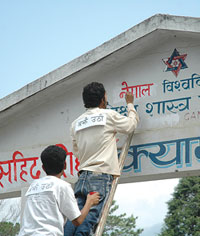 So the people are officially sovereign. Good. And that horrible parody of a national anthem is going. Excellent. Gyanendra Shah's wings are clipped and Paras could be tried for murder and other crimes. Couldn't be better.
So the people are officially sovereign. Good. And that horrible parody of a national anthem is going. Excellent. Gyanendra Shah's wings are clipped and Paras could be tried for murder and other crimes. Couldn't be better.
But again, MPs and Maoists alike need to remember something. It's not just the royals and feudals who are resented by the Nepali people. They too are stained by dishonour and more than a little blood.
Before I reluctantly left Nepal in 2004, I used to venture forth from time to time to meet villagers and cadres in Maoist areas like Rolpa, Rukum, Dang and Salyan. Sometimes women carried the guns, most often it was men. But to a person, they would tell tales of atrocities and how these had driven them to become peoples' warriors.
Much of the time, especially before 2002, they were not talking about the RNA, now NA. It was the police and the armed police that had killed, maimed, tortured raped and stolen. Yes, these days, you'd find a horrible litany of abuse on the lips of country folk. But for much of the Maoist war, the army refused to get involved.
In those early years from 1998 until 2002, the names that stood accused of ordering horrific abuses weren't yet Shah, Rana or Thapa. Those cursed for a disappearance or a brutal police action would be Deuba, or Koirala. Bam Deb Gautam wasn't particularly well thought of either, despite his leftist credentials.
These gentlemen, now so prominent in the nation's newly restored loktantra were in charge when the brutal operations known as Romeo, Kilo Sierra 1 and Kilo Sierra 2. Sher Bahadur Deuba and Comrade Gautam as ministers were believed to have ordered police actions. Girija Prasad Koirala was prime minister during some tough times.
Amnesty International and other groups rightly condemned elected Nepali governments for those operations. International media and local reporters spoke to victims and found horror stories galore. The Maoist war began and worsened under democracy. Democrats ordered murders, brutality and vengeful assaults on villagers in Kalikot, Salyan, Rukum and Rolpa.
Nor do the Maoists have anything to be sanctimonious about. Their violence arose because they couldn't function peacefully in a democratic system, however flawed. They ruthlessly targeted politicians and political parties for much of their so-called 'Peoples' War'. From time to time, headline attacks on the security forces would give the illusion that an actual war was under way. But mostly, cadres and commissars systematically exterminated the infrastructure of political parties. The UML, for much of the 90's the most viable democratic force in rural Nepal, came in for particularly brutal attention.
Who could forget how Maoists deliberately savaged the few gains of 1990s democracy? Physical infrastructure was blown apart and so were the DDCs and VDCs-both of which were becoming successfully entrenched as forces for real change at local and regional levels. The Maoists saw this as a threat to their myth-driven ideology, so they blew up buildings, oppressed employees and kept political control firmly in their mailed fists.
Sure, Nepal needs to be modern, sovereign and probably some sort of republic. It's up to the people. And those who wreaked havoc and devastated the land need to answer for their crimes up to and including Gyanendra Shah, his cronies and sycophants, senior RNA officers and others. But as the weeks progress, let's be wary of attempts to claim that justice is done when the feudals are purged.
There are plenty of democrats and peoples' warriors with the peoples' blood on their hands. At very least, they need to own up to their sins and apologise to those who suffered from them. At very least.



